- Home
- Mack Maloney
Starhawk s-1 Page 7
Starhawk s-1 Read online
Page 7
“Tell it to me, then,” she said.
The spy took a deep gulp of wine. He would have to choose his words carefully.
“I think trouble is coming, my lady,” he said soberly. “In fact, it may already be here.”
The Empress thought about this for a moment. She used the spy only on the most secret of affairs. She had entrusted him to ferret out the truth for her, no matter where it might be hiding in the realm these days. Being able to do so was a rare talent. So when he spoke, she tended to believe him.
“And why do you feel this way?” she asked.
The spy leaned forward in his seat.
“You’re aware of the attack on the BonoVox?”
She nodded. “Most unnerving. What have you heard lately? Has anyone got a theory on how a Blackship penetrated… what do you call it again?”
“Supertime, madam… and no, the word is solid on this: No one has any idea how it was able to break through the Ethers. There’s a substantial internal investigation already ongoing. Ordered by your husband, I believe?”
She nodded brusquely.
“But how can they possibly investigate such a thing?” she asked. “It happened so far out…”
The spy tasted his drink. “I am no expert on these things, my lady,” he began correctly. “But I believe there is a way, a formula of some kind, that can determine where and how much power from the Big Generator the Blackship used while in Supertime. Once this is discovered, they might be able to track these units of power back from the source to its recipient in the moments before the attack.
Reconstructing the crime, so to speak. That can only lead to further revelations, I’m sure.”
The Empress dabbed her eyes.
“What I find particularly disturbing about this whole affair was the fate of those marauders caught in space after their ship was destroyed. They chose to end their own lives rather than be captured? Is that so?”
“They shot at each other until the last man blinked out,” the spy confirmed. “A very bizarre situation, all agree. Personally, I’ve never heard of such a thing.”
“Wouldn’t we have just held them in our jails had they been captured?”
The spy nodded. “And therein lies the strangeness. Our prisons are not places that further blacken men’s souls. These people would have been interrogated, yes. Scanned. Brain scrubs, the works. But afterward, they would have been sent somewhere fairly comfortable and been fed and clothed. A vast improvement over life as a pirate, snorting ion-ballast crystals whenever your food tube runs low.”
The Empress shivered noticeably. “Why kill themselves then?” she asked.
The spy just shook his head.
“Madam, no one I know has a clue,” he said.
She shivered again. “This is not a good situation…”
“True, but it is the reality of this Blackship appearing in Supertime, that is what’s really bothering me,” the spy said. “Not only is it baffling, it might prove catastrophic for all warships as well. We have always enjoyed complete invincibility within the Ethers. Complete invincibility. That’s a tough thing to lose. I know for a fact that our top commanders are now considering sending starfighter escorts with all ships traveling in Supertime out on the Fringe. This has never been necessary before. But now, should something like this happen again — well, the captain of the next ship attacked might not be as lucky as Zap Multx.”
The Empress nodded. “There was talk of giving the shuttle pilot who helped — does anyone even know his name? — some kind of commendation for his bravery. But Multx has managed to bury him somewhere. I can’t say I blame him. It is not like a starship captain to want a lowly shuttle pilot to get medals for saving his ship.”
“It’s best that the whole affair be kept quiet — we don’t need to be giving anyone any medals,” the spy said. “As far Zap Multx, my sources tell me his streak of luck is about to end.”
She sipped her drink. The fire waned a bit.
“But however the Blackship managed to get into the Ethers,” she said, “wouldn’t someone, somewhere in your network have heard something before the attack on the BonoVox? A loose set of lips out on the Fringe? A drunken braggart among the pirates? I mean, planning for such a monumental event could not have happened in a vacuum. Could it?”
The spy shook his head again. “Therein just lies more strangeness, my lady,” he said. “Word of such a dramatic plot would have leaked out eventually and traveled around the Fringe very quickly. As you know, there are few secrets that last very long out there. Yet my best contacts tell me these particular pirates were absolute unknowns — they certainly weren’t from the Sileasian System. No one knows what group they were from. No one knows where their bases are or even what sector they call home.”
The Empress stared into the fireplace again. Another log appeared, sparking new life to the smoldering embers.
The spy went on: “And why in the world would they attack a ship like the BonoVox? Think of what havoc they could have caused among our trading and cargo ships. What plunder they could have secured!”
“What were their motives, then?” the Empress pressed him. “To capture a second ship capable of Supertime?”
The spy shrugged. “That’s quite a goal for a first foray,” he said. “Pirates are usually a disorganized lot, and long on dull minds. Some can barely operate the claptrap vessels they use now. Trying a ship-to-ship takeover, as your first sortie into the Ethers? I’m not sure even our best troops could pull that one off.”
A brief silence fell. The fire was blazing again.
“So then,” she finally said, “I’m sure the incident itself is already the whisper of the Fringe.”
“It is,” the spy confirmed.
“And the conventional thinking is?”
The spy paused before answering.
“That these pirates,” he finally began, “if they were pirates, must have received the Supertime technology from someone… well, close to us, I’m sad to say.”
The Empress was stunned. Her shoulders dropped dramatically.
“Are you suggesting… that someone in our own forces gave this sacred technology to them?”
The spy shook his head once again. “What other explanation could there be, my lady? Even if the pirates simply stumbled upon the technology — in a shipwreck, let’s say — they still would have to implement it.
And even then, they somehow would have to learn how to tap into the Big Generator. I don’t know anybody who knows how to do that — not from scratch, anyway.”
The Empress could barely move. “My God, where does that trail lead? Disloyalty in our ranks? That’s exactly what led to the downfall of the Third Empire. And I suspect the first and second ones as well.”
“Thus my fear of dark clouds on the horizon, my lady,” the spy whispered. “When the storm hits, it might be some time before it is clear skies again.”
A much deeper silence engulfed the room now. Even the fire fell quiet. The Empress’s face had turned ashen. Her hands began to shake, and she could barely hold her glass. The very thought of lèse-majesté in the Empire’s military was enough to make her chest tighten and her brow moisten with sweat. She hoped her façade would not fail her now.
Finally she broke the spell.
“You have always provided great advice and counsel for me,” she said to the spy. “I pray this occasion is no different.”
But the spy just slowly shook his head. “I wish it were not so, my lady,” he said. “But I have no advice. Only that we must be vigilant — about many, many things.”
He drained his drink and got up to go.
“If there was only a science to these things,” he mused. “If only someone had come up with a way to predict events of the future. Five minutes from now. Five days. Five years. Five centuries…”
“No such science exists,” the Empress said sadly. “Unless it is hiding in the heart of the poet. So we remain at a disadvantage, not knowing what the future
will hold.”
The spy laughed grimly. “Everything we can do — and yet the thing that we want the most, we don’t have.”
She finished her drink and watched her glass slowly disappear.
“Such as it is with life,” she told the spy, “No matter how long some of us might live…”
11
There were two major players in the Empire’s military hierarchy.
The Space Forces (SF) were the element that projected the Empire’s policies to the far reaches of the Galaxy. The Inner Defense Forces, more readily known as the Solar Guards (SG), were responsible for all security inside the Pluto Cloud.
Or at least that’s how it was supposed to be.
It was one of the many ironies of the Fourth Empire that the Solar Guards could be found in just about every corner of the Galaxy, while many vessels of the Space Forces fleet spent their time cruising close to the Pluto Cloud, where the Empire’s major repair, refurbishing, and training facilities were located.
The two services did not get along. Their top officers hardly spoke to one another, and when they did, they rarely agreed on anything. They used different types of equipment, flew different types of starships, and issued entirely different kinds of weapons to their soldiers. They even had different orders of rank and different styles of uniforms. The Space Forces wore blue with yellow trim, the Solar Guards wore black with red.
The Space Forces — comprised of the Navy, the Army, and the Air Service — were essentially mobile infantry and a means to get them where they wanted to go. The Solar Guards were more paramilitary, an army of policemen. They had spent much of the past three centuries cruising the Galaxy, working on countless investigations, some of them legitimate (such as tracking down tax outlaws), but many more done on a whim. As a result, the Solar Guards conducted their own wars and the Space Forces conducted theirs. The two services had never fought side by side against a common enemy.
The Space Forces liked to think of themselves as the senior, more professional service. Indeed, their roots went back more than a thousand years, a history that somehow survived the last two Dark Ages.
The Solar Guards, on the other hand, were the upstarts, established just three hundred years before.
While they boasted just half the number of men in arms as the Space Forces, their troops were considered more specialized, better trained, more ruthless. And, as keepers of the Inner Flame, they were also closer to the Imperial seat of power. Much time and effort were spent by the Space Forces to make sure their views and visions were not underrepresented before the Emperor. The top officers of the Solar Guards, however, excelled in wreaking havoc with any Space Forces initiatives.
The main conflict between the two rivals was philosophical. The Solar Guards believed the Empire’s best path to success was to reclaim as many of the Galaxy’s planets as possible, as quickly as possible, and bring them into the Empire’s fold. The Space Forces were dedicated to the same goal, but they believed the best way to accomplish it was to go after the troublesome planets first — and bring the more peaceful, law-abiding planets back in gradually. So it was not a question of expansion, but how quickly that expansion would be carried out.
But what determined which worlds were troublesome? It was not a black-and-white issue. The Galaxy was divided into hundreds of millions of sectors, but for the most part, those systems in the center, called the Ball, were peaceful, loyal, and solid in their support for the Emperor. The worlds out on the fringe were more problematic. The farther one went from the center of the Galaxy, the more lawless and wild the planets became. Yet among these worlds were peaceful civilizations as well, many of them lost for more than a millennium and not even aware they were part of the Empire.
In bringing the rule of the Fourth Imperial Dynasty to the Galaxy, neither the Space Forces nor the Solar Guards could claim a spotless record. The Empire had more than ten trillion men under arms. Perfect performance was an unlikely possibility, to say the least, especially with the frightening superweapons the Empire possessed.
But the Spaces Forces, at least, recognized their errors and sometimes went to great lengths to correct them.
The Solar Guards didn’t have time for such soul-searching.
There was a third service within the Empire forces.
This was the Expeditionary and Exploratory Force, known to all simply as the X-Forces.
The X-Forces were comparatively small. They had about a tenth the number of troops as the Space Forces, fewer than half that of the Solar Guards. The X-Forces mandate was to fly to the Outer Fringe and identify those planets lost since the last Dark Age and even beyond. In many ways they were the scouts before the cavalry.
While most of the big starships flown by the X-Forces carried their share of troops, they also lugged around many forms of humanitarian aid, plus scientists, physicians, and representatives of the Empire’s diplomatic corps. Very often the first time the people of a reclaimed world even saw the Empire’s banner it was painted on the side of an X-Forces vessel. Sometimes working in secret, sometimes not, the men and women of the Expeditionary and Exploratory Force were truly the professionals and went about their far-flung jobs accordingly.
As such, the X-Forces had absolutely no political power anywhere in the Galaxy.
Which was why they were not invited to this very secret meeting.
Up the absolutely straight banks of the First Canal, about twenty-five miles north of the center of Big Bright City, was an area of preserved woodlands known by the archaic name Chesterwest.
An enclave of nature in the midst of the sprawl, the trees grew so thick in Chesterwest, some parts seemed perpetually bathed in twilight. One part, a place known as Sector Cello, was an especially isolated area, famous for its nearly impenetrable woodlands and countless places to hide. That’s why the Space Forces and the Solar Guards had selected it as the best location to hold their very clandestine meeting.
It was close to midnight when the two shuttlecraft landed at the base of the Chesterwest mountain called Many Tears. There was a long-abandoned muster hall here. Constructed of blackwood and plastic, it was simply one big room, with no windows and just one door. Twelve men emerged from each shuttlecraft. They filed into the ancient muster building without exchanging a word, the sky above them dancing with the glow of StarScrapers being beamed up from downtown Big Bright City.
This meeting was very unauthorized. Unofficial contact between the SF and the SG without a representative from the Imperial Court on hand was considered a high crime of disloyalty. If the principals here had been caught gathering like this, they would all be executed, probably on the spot, most definitely without benefit of a trial.
Still, over the years there came times when the two opposing forces just had to talk, to settle some dispute, to smooth over some feathers. Usually the two parties sat at a table and had an orderly discussion. This time it was different.
This time it was very tense.
Zap Multx was there for the Spaces Forces; Loy Staxx was on hand as well. The most senior SF officer on hand, however, was an Army ten-star general, Skol Fyxx.
Like most SF commanders, Fyxx was a huge individual, square jaw, bald head, a few authentic body scars, and many tattoos. He was 199 years old. A veteran of countless wars, he was known throughout the Galaxy as a heroic commander and fierce strategic warrior.
On the other side there was SG First Commander Jak Dazz. Dazz was everything Fyxx was not. He was short, pudgy, free of any scars or tattoos. He was a raging egomaniac, cunning and clever in battle, but with an absolute distaste for getting his own hands dirty.
As their men lined up behind them, Fyxx and Dazz now met in the center of the musty room. Fyxx was at least three feet taller than Dazz. Someone activated a humbeam; the room was now safe from eavesdropping from anywhere in the Galaxy.
“How long has it been, Skol?” Dazz asked, his voice thick with false charm.
“Not long enough,” Fyxx replied.
; Dazz looked at the line of SF officers behind his counterpart.
“Multx! You’re looking… somewhat recovered,” he said snidely. “When I heard about what happened to the Vox, I prayed that you were not among the casualties.”
Multx looked like he’d just taken a sonic blast to the chest.
“I would have prayed in the same way for you, had it been your ship attacked…”
Dazz laughed. His men laughed, too.
“Not much chance of that,” Dazz said under his breath.
He fixed his gaze on Loy Staxx now, the man who had been forced to withdraw from the Sileasian campaign.
“And you, Staxx… I’m just glad to see you up and around,” Dazz said. “I heard those punks on Vines 67 were a handful.”
Staxx was a tall, proud man of color, 214 years old, with white hair and beard. As with Multx, he took Dazz’s comment like a knife to the heart.
Fyxx took a step closer to Dazz, effectively towering over him.
“Let’s cut the nonsense,” Fyxx said with a growl. “You know why we’re all here.”
Dazz just smiled, took out an atomic cigar, and lit it up. He let the blue smoke fill the room. Then he crossed his arms against his chest and said: “Okay, this was your idea. So talk…”
Fyxx could barely restrain himself. He could have crushed Dazz like a bug at that moment, but he knew only disaster would result from that. He tried to stay calm.
“Even though it is still a state secret, you seem to know a lot about what happened to the BonoVox,” he began slowly. “Any ideas on how that Blackship managed to get into Supertime?”
Dazz just laughed again. His men did, too.
“Sure I do,” he replied.
“Really?” Fyxx asked. “Enlighten us, then…”
Dazz took a long puff of his cigar and blew the smoke just inches above Fyxx’s head.
“Well, obviously those mooks got ahold of a prop core,” Dazz said sarcastically. “And then figured out how to tap into the Big Generator.”
More laughter from the Solar Guards.
“Is that so?” Fyxx spit back at him. “And where do you think these mooks got the prop core? Did they just find it? Or did someone give it to them?”

 Strike Force Bravo s-2
Strike Force Bravo s-2 Operation Caribe ph-2
Operation Caribe ph-2 Beyond Area 51
Beyond Area 51 Strike Force Delta
Strike Force Delta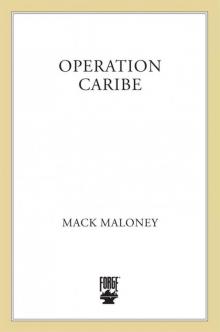 B00447820A EBOK
B00447820A EBOK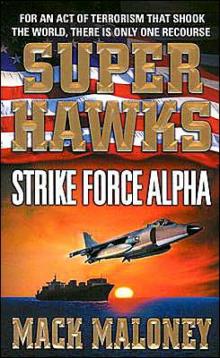 Strike Force Alpha
Strike Force Alpha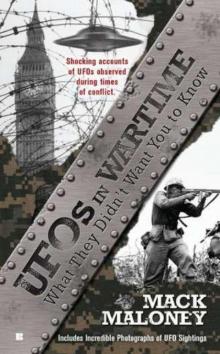 UFOs in Wartime: What They Didn't Want You To Know
UFOs in Wartime: What They Didn't Want You To Know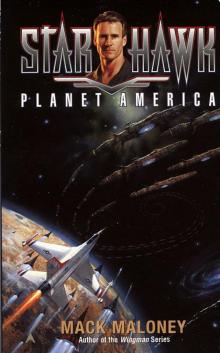 Planet America s-2
Planet America s-2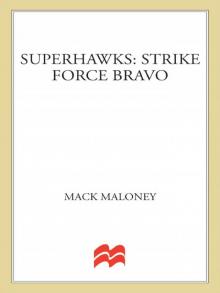 Strike Force Bravo
Strike Force Bravo The Circle War w-2
The Circle War w-2 Operation Sea Ghost ph-3
Operation Sea Ghost ph-3 Strike Force Delta s-4
Strike Force Delta s-4 The Wingman Adventures Volume One
The Wingman Adventures Volume One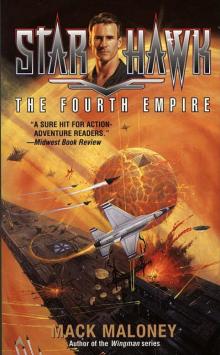 The Fourth Empire s-3
The Fourth Empire s-3 Battle at Zero Point s-4
Battle at Zero Point s-4 Attack on Area 51
Attack on Area 51 Chopper Ops
Chopper Ops B003IKHEWG EBOK
B003IKHEWG EBOK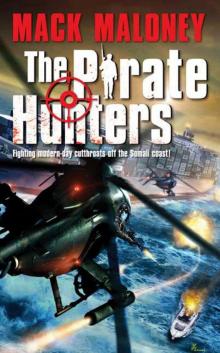 The Pirate Hunters ph-1
The Pirate Hunters ph-1 Chopper Ops co-1
Chopper Ops co-1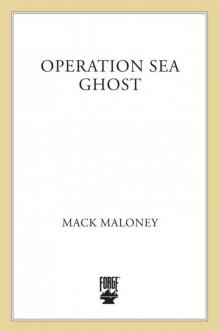 B005J4EW5G EBOK
B005J4EW5G EBOK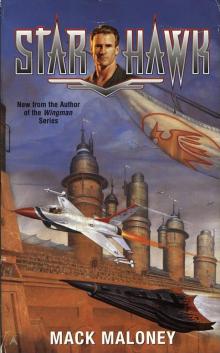 Starhawk s-1
Starhawk s-1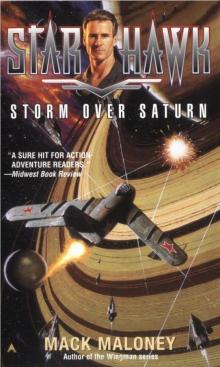 Storm Over Saturn s-5
Storm Over Saturn s-5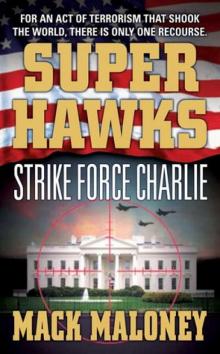 Strike Force Charlie s-3
Strike Force Charlie s-3